Artificial intelligence (AI) is no longer just a futuristic concept; it has become a powerful force reshaping the fashion industry. From optimizing design processes to enhancing inventory management, AI unlocks significant opportunities for innovation and efficiency across the entire value chain. It enables personalized customer experiences and targeted marketing strategies, making fashion brands more agile in meeting consumer demands.
By integrating AI into various stages of product development, production, marketing, and customer interaction, the fashion industry is witnessing remarkable gains in speed, cost-efficiency, and personalization.
This article explores these transformative impacts, drawing on real-world case studies and industry insights to showcase how AI is revolutionizing fashion and paving the way for unprecedented growth and creativity.
Leading fashion brands are increasingly adopting Artificial Intelligence (AI), Augmented Reality (AR), and voice shopping to keep pace with these evolving consumer expectations, while also boosting revenue and customer loyalty. Generative AI development services, in particular, are revolutionizing the industry—enhancing product design, streamlining production, and personalizing customer experiences.
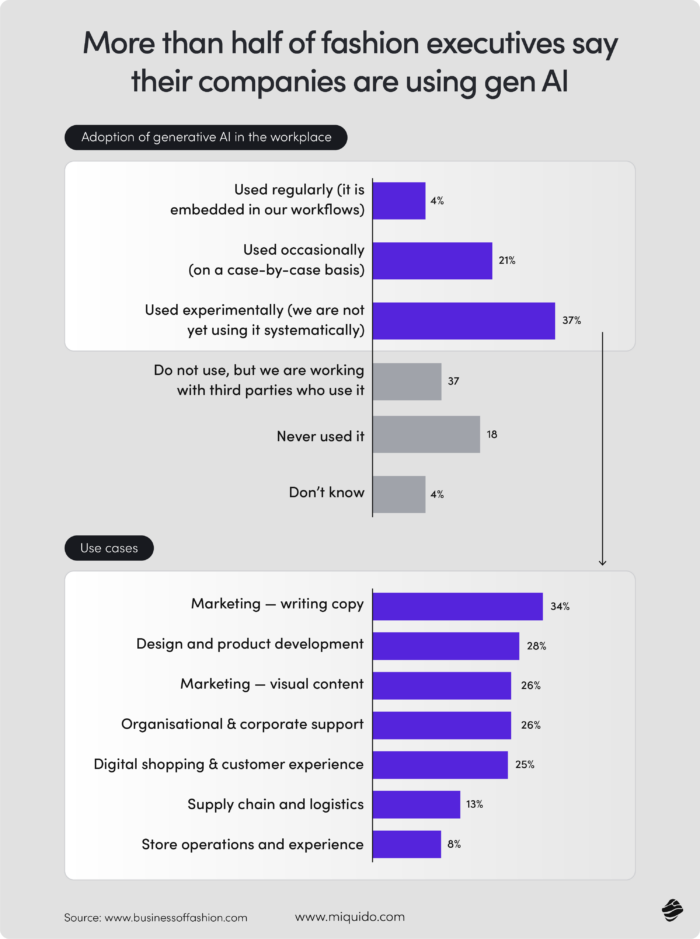
With AI’s potential to increase profits in the apparel, fashion, and luxury sectors by $150–275 billion over the next 3-5 years (McKinsey analysis), fashion is clearly at the forefront of this technological transformation.
GenAI-driven fashion design and development
AI rapidly transforms fashion design, significantly reducing product development cycles and providing designers with innovative tools to create collections faster and more efficiently. By leveraging generative AI, fashion brands can now analyze real-time trends—aggregating sentiment from social media videos or modelling consumer preferences from various unstructured data sources. This capability allows brands to develop collections that align with current trends while drastically reducing prototyping time by up to six months.
For many fashion businesses, AI has the potential to accelerate processes throughout every stage of the product lifecycle. During the design phase, AI can help transform quick sketches into detailed, high-quality drawings, convert prompts into mood boards, and turn descriptions into 3D models.

Additionally, AI enhances the shopping experience by improving search results and allowing designers to access a brand’s catalogue to create new variations inspired by past designs, bringing fresh twists to iconic looks.
Luxury brands such as Dior and Louis Vuitton use AI-powered trend analysis to create designs that resonate with evolving customer tastes, while fast fashion brands like Shein use AI for rapid product design and launch, making them agile in responding to emerging trends.
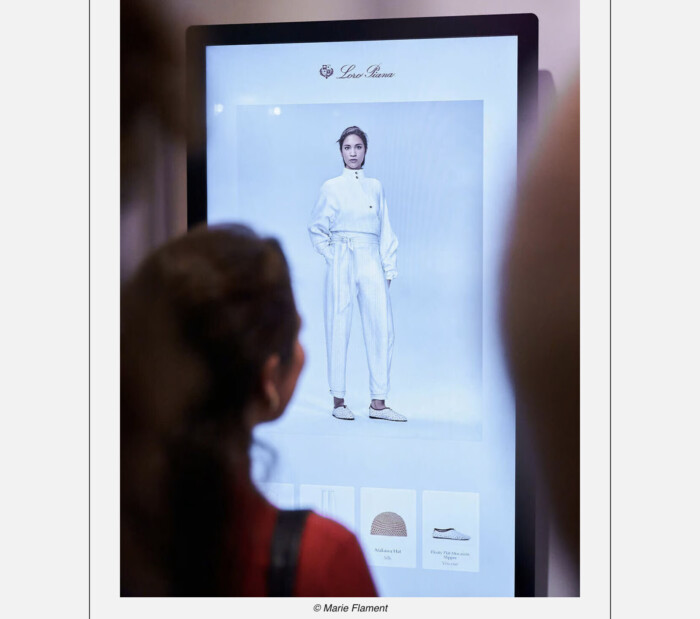
The Impact of Generative AI on fashion designs creativity
Generative AI is also transforming the creative process itself. Designers can input sketches, fabric choices, and colour palettes into AI-driven platforms like Cala or Raspberry AI, generating numerous design variations. The approach not only speeds up the design process but also allows creative directors to explore a wide array of styles, ultimately tailoring the designs to different body types and with their signature brand touches.
This technology enables innovative, limited-edition product drops and potential brand collaborations. For example, AI can even use facial-recognition technology to create custom eyeglasses by scanning a customer’s facial features and tailoring the design to their specific style and size preferences.
McKinsey indicates that design and production are the areas where AI will bring the most value, confirmed by 73% of fashion executives. This shift in the design landscape has already started to materialize. In December 2022, the AiDLab (Laboratory for Artificial Intelligence in Design) in Hong Kong showcased a fashion show featuring designs supported by generative AI, using platforms like Designovel and Fashable. The below example presents a model snapping a selfie backstage ahead of the debut of the first designer-led AI event, “Fashion X AI Call For Young Talents 2022“
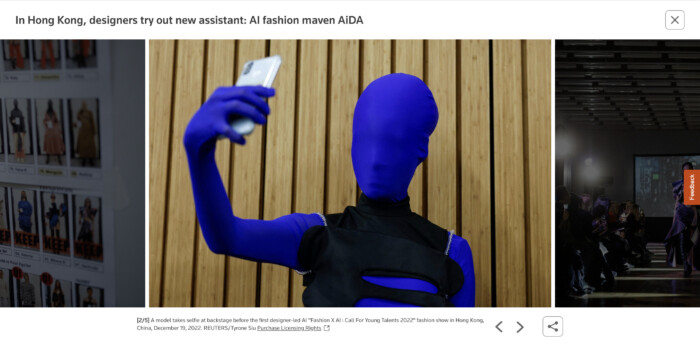
These technologies are enabling fashion designers to explore limitless creative options, test variations without costly physical samples, and accelerate their overall production processes. With AI’s increasing role in both creative exploration and practical production, the fashion industry is poised to enter an era of unprecedented design innovation and efficiency.
Generative AI in fashion marketing and customer engagement
In the ever-evolving landscape of fashion eCommerce, personalized marketing has become a vital strategy for driving customer engagement and loyalty. Generative AI (GenAI) is at the forefront of this transformation, helping fashion brands craft tailored experiences that not only increase conversion rates but also foster brand loyalty.
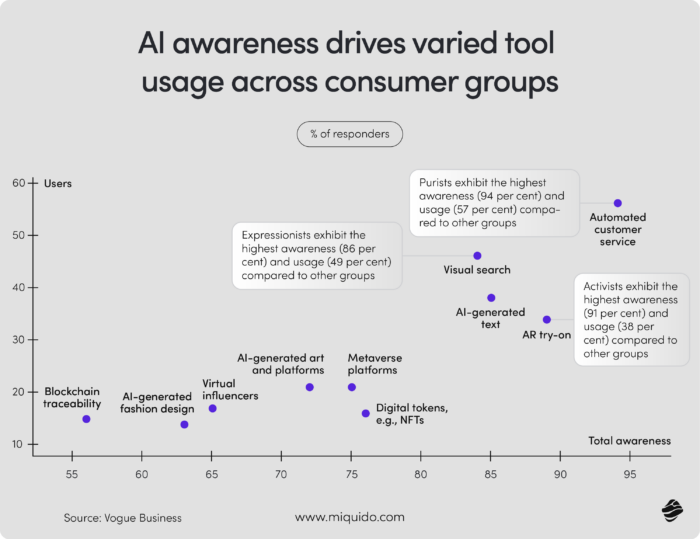
Personalization at the centre of all marketing and sales initiatives of fashion brands
By leveraging consumer data, GenAI delivers highly personalized content—from AI-driven product recommendations to virtual try-ons—which has been shown to boost return on investment by up to 30%.
For example, Lalaland.ai collaborates with brands like Levi’s and Calvin Klein to create targeted marketing initiatives, while Tommy Hilfiger’s FashionVerse uses GenAI to produce realistic 3D styling experiences that resonate with younger audiences. This immersive personalization is crucial for reaching early adopters like Millennials and Gen Z shoppers who seek engaging, technology-enhanced experiences.
Another example is Zalando, a major fashion eCommerce platform in Europe, demonstrating the power of AI-driven personalization. By customizing product recommendations based on browsing history and individual user preferences, Zalando has seen notable improvements in customer engagement and conversion rates, establishing itself as a leader in tailored shopping experiences.
According to a recent Google and Vogue Business report, AI-driven personalization not only meets consumer expectations for individualized shopping but also significantly boosts their intent to purchase. This combination of precision targeting and immersive experiences enabled by GenAI is pushing the boundaries of customer engagement, allowing fashion brands to establish deeper, long-lasting relationships with their audiences.
Fashion advertising boosted with Generative AI technology
Generative AI (GenAI) empowers fashion brands to craft advertising campaigns tailored to specific audience segments, enhancing relevance and engagement.
For instance, luxury brands can utilize GenAI to create personalized visual ads that align with the geographic regions, languages, and aesthetic preferences of their target audiences. This level of customization makes advertisements more pertinent to consumers, thereby boosting conversion rates.
Notably, AI-generated ads personalized to user preferences have demonstrated a 25% increase in interaction rates compared to traditional ads. This improvement stems from GenAI’s capability to adapt content for diverse audiences, modifying elements such as design and copy to suit local and demographic preferences.
What’s more, fashion companies now leverage Generative AI to generate product descriptions, ad copy, social media posts, and various other types of content that are automatically tailored to fit different audiences and platforms. Learn more about AI in eCommerce and how it is transforming the shopping experience for users.
Generative AI’s Impact on fashion eCommerce and customer experience
Generative AI is reshaping the online shopping experience in fashion eCommerce by making it more interactive, immersive, and tailored to individual customers. From AI in entertainment to eCommerce, these technologies are transforming industries by enhancing user experiences. Through advanced solutions like realistic virtual clothing try-ons, GenAI allows customers to visualize products on themselves before buying, leading to significant boosts in customer engagement.
ASOS has taken personalization a step further by introducing “Enki,” a voice-activated chatbot integrated with Google Assistant, enabling customers in the UK to make voice-based purchases. This innovation has not only elevated customer convenience but also increased ASOS’s Net Promoter Score (NPS) by 50 points within the first two years of launch.
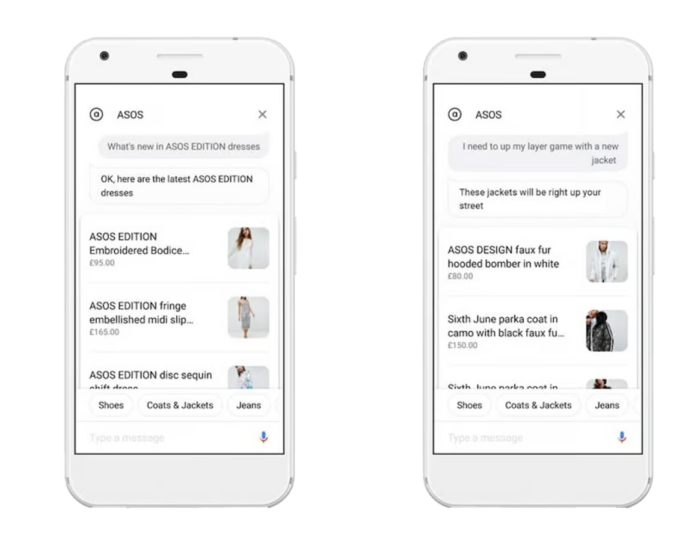
In addition to personalization, GenAI also supports more efficient customer service and tailored product demonstrations. AI-generated product descriptions, virtual try-ons, and chatbots have transformed how brands interact with customers.
Chatbots can handle advanced queries, manage in-store pickup reservations, and facilitate direct sales—making the shopping journey seamless. These AI-powered virtual assistants can collect valuable customer data, detect common behavior patterns, and offer multilingual support, which is crucial for global brands.
In-store AI tools further enhance customer service by helping staff identify products that suit a customer’s body type and preferences, enabling a more personalized and satisfying shopping experience. Together, these applications of GenAI are fundamentally improving the fashion eCommerce landscape by making it more responsive, tailored, and customer-focused.
Generative AI in fashion: examples of successful implementations you must watch
Leading fashion brands effectively utilise Generative AI (GenAI) to enhance their operations, streamline the creative process, and deliver innovative customer experiences. Generative AI in fashion is revolutionizing the industry by blending human creativity with cutting-edge machine learning, offering fashion brands the ability to create, design, and market faster while providing highly personalized consumer experiences.
Zalando: generative AI-powered tool that recommends personalized outfits
Zalando has launched the Algorithmic Fashion Companion (AFC), a GenAI-powered tool that recommends personalized outfits based on user preferences. This implementation has been highly successful, resulting in a 40% increase in average basket size and an 87% growth in adjusted EBIT during Q2 2023, driven by the strategic focus on leveraging generative artificial intelligence technology.
The success of Zalando’s GenAI efforts has not only boosted sales but also increased appeal among high-profile partners, including brands like Lululemon and Lancôme. The ability to provide real-time, curated outfit recommendations through GenAI enhanced Zalendo’s personalization of online shopping, delivering greater value to customers and improving overall satisfaction.

La Redoute’s mobile app with image and voice recognition
La Redoute also demonstrates genAI’s influence by becoming the first brand in Europe to integrate both image and voice recognition into its mobile app. These tools have empowered La Redoute to offer personalized shopping recommendations, contributing to an impressive rise in mobile sales, which now account for 38% of their revenue. Such tools enable brands to build more tailored consumer profiles, creating a more engaging shopping experience.
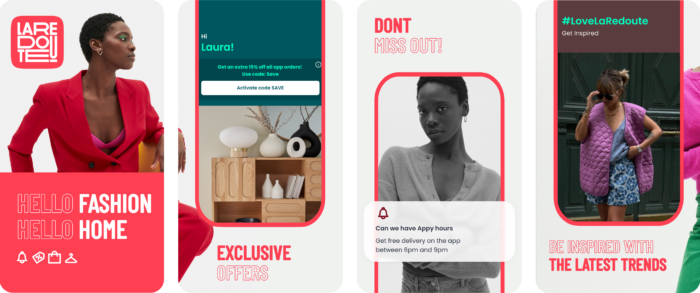
Victoria’s Secret examples of generative AI in design and marketing initiatives
In the realm of product design, Victoria’s Secret has embraced gen AI to create innovative lingerie collections. By analyzing consumer preferences and market trends, Victoria’s Secret uses generative models to generate unique, creative designs that resonate with their target audience. This approach not only enhances the brand’s ability to generate new ideas but also speeds up the design generation process, ensuring products reach the market faster while maintaining a high level of appeal to their customers.

Major social media buzz with users embracing AI-enhanced Victoria’s Secret’s filters
What’s more, the Victoria’s Secret Angel filter has generated significant excitement on social media, with users enthusiastically sharing their AI-enhanced transformations into runway-ready models. This trend has been particularly popular during events like Halloween, where individuals showcase their glamorous, angelic looks. The filter’s ability to create personalized, high-fashion images has captivated users, leading to widespread sharing and engagement across platforms.
Casablanca: blending of technology and creativity
Casablanca has leveraged GenAI to create visually captivating social media content and marketing campaigns. By using AI-generated imagery that aligns with the brand’s signature aesthetic, the fashion company boosts its digital presence and engages consumers through innovative, targeted marketing that stands out on digital platforms. This use of generative artificial intelligence highlights the blend of technology and creativity, offering a glimpse into the future of fashion marketing.

Stitch Fix: gen AI for tailored suggestions driving user engagement
Stitch Fix, another notable fashion brand, uses GenAI technologies to create personalized clothing recommendations for their users. By analyzing individual style preferences and customer feedback, Stitch Fix generates tailored outfit suggestions, enhancing customer satisfaction and engagement. This use of AI tools in online shopping enables the company to adapt to different parameters of consumer tastes, offering personalized experiences at a scale that traditional methods cannot match.
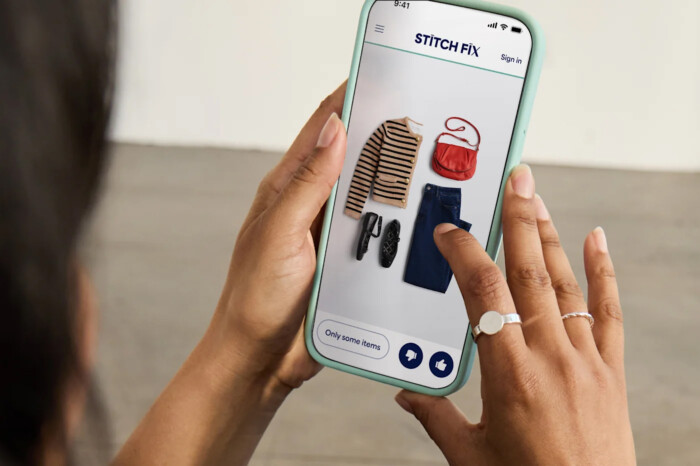
Conclusion to generative AI in fashion: creativity, sustainability, and customer-centric experiences
Fashion brands are increasingly integrating generative AI into various aspects of their businesses to improve operational efficiency, design generation, and customer engagement. The adoption of GenAI allows companies to respond to consumer trends in real-time, optimize store operations, and even assist fashion designers in producing entirely new designs and product lines.
However, the cost of running an AI app development project is an important consideration for brands looking to innovate. By leveraging GenAI for product personalization, virtual assistants, and targeted marketing, fashion companies are not only enhancing customer experience but also securing their place at the forefront of an ever-evolving market. As technology advances, its practical applications in fashion will continue to reshape the industry—fostering more creativity, reducing environmental impact, and, ultimately, setting new standards for innovation.

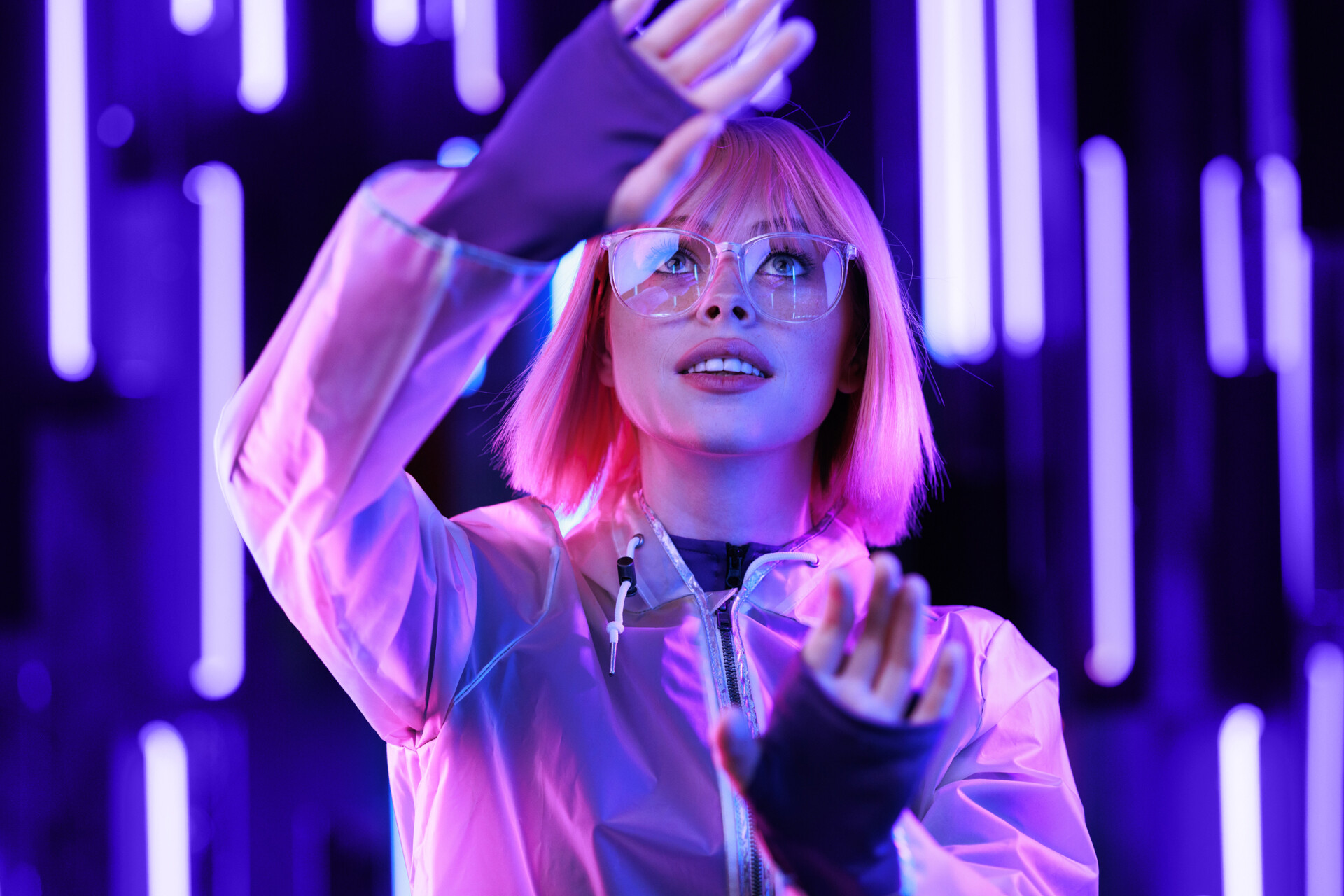


![[header] top ai use cases in manufacturing](https://www.miquido.com/wp-content/uploads/2025/04/header-top-ai-use-cases-in-manufacturing-432x288.jpg)



![[header] how is ai used in the music industry overcoming trust, fraud & transparency challenges with ai](https://www.miquido.com/wp-content/uploads/2025/04/header-how-is-ai-used-in-the-music-industry_-overcoming-trust-fraud-transparency-challenges-with-ai-432x288.jpg)